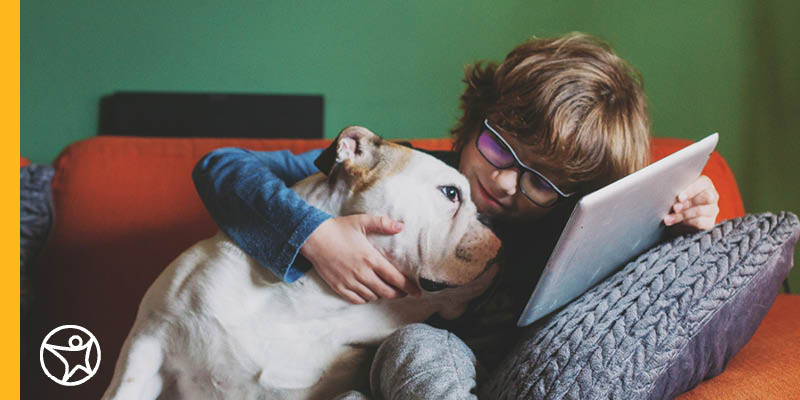Setting Healthy Screen Time Limits for Students Learning Online
by Julie Hersum
byElizabeth Preston
5 min to readPets can be vital parts of families, and they can help kids learn life lessons as well as increase their emotional intelligence. So, why should kids have pets? Let us count the ways...
Pets make for great teachers for kids. Here is just how pets help kids learn.
With pets, kids must learn how to take care of an animal, which requires teaching about pets’ needs and preferred environments. This gives parents and Learning Coaches great opportunities to teach kids fun facts about animals. For example, a pet fish provides students a chance to learn how fish breathe underwater and the importance of water quality. A pet reptile gives kids a chance to learn about cold-blooded animals and the importance of a heat source in an environment.
Teaching kids about pets also helps them to learn to be responsible for the health and happiness of the animal. Pets require feeding and cleaning routines, and some pets need to be taken on walks. Taking care of a pet can teach kids the importance of being dependable for those who count on you.
Developing emotional intelligence and social skills helps kids grow into happy and confident adults who can manage stress.
To properly care for an animal, children often learn to listen to their pet and be attuned to their needs. These same skills are essential for developing empathy skills and understanding nonverbal communication in people.
Research also finds that pets can teach children tolerance and acceptance.
Research shows that pets reduce people’s levels of stress and aid humans in self-soothing and coping with difficult emotions. Part of this is because pets can act as anchors for us. When it feels as if the world is falling apart, we still have our pets to hang onto and to give us unconditional love.
Some kids struggle with making friends and with social interactions. Pets can act as a point of connection with others. For example, a child may feel shy about talking about themselves, but, oftentimes, they will be happy to talk about their pet.
Pets also teach children about respecting boundaries, which is another important social skill to have.
Oftentimes, a pet can become a child’s best friend and a reliable playmate. So, pets can help guard against loneliness and give children a vital connection to another living being.
Pets often encourage children to be active—whether that’s going for a walk, cleaning a pet’s tank, or playing with a pet. Such routine activities can reduce anxiety and depression in children and increase their overall well-being.

Yes! Some pets can help students focus because research finds that stroking an animal can help children feel secure and reduce feelings of anxiety, depression, and being overwhelmed. Feeling relaxed can help students stay more focused on the task at hand. And interacting with pets can also act as a reward for students after they finish their schoolwork.
Some people cannot make a dog or cat part of the family for a variety of reasons. However, your child can still learn from pets and animals.
Animal shelters frequently need volunteers, and kids volunteering can show students the importance of taking care of pets as well as teach them empathy and compassion. Some shelters even have programs where students read to the animals, which helps students practice reading and gain confidence in their reading skills. There are also programs where volunteers can walk dogs, which give both the dogs and volunteers valuable exercise.
You can contact your local shelters to see what programs they have available.
Many people work outside of the home and are unable to walk their pets during the day. You can ask friends or neighbors with pets if they would like you and your child to check on the animal, feed it, and walk it if necessary.
Pets can teach children many important lessons and increase their emotional intelligence. If you are considering getting a pet for your child, then make sure to think about what space, time, and resources you have available for a pet and research which pet would be right for your family. Remember, if you can’t have a pet for your child now, there are still plenty of opportunities for your child to interact with pets and reap the many benefits that pets can have for children.
